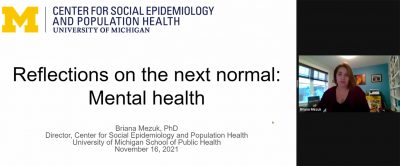Many people have had their mental health negatively affected by the pandemic, and BU has taken notice. “The Next Normal: Mental Health,” a panel presented Tuesday by the Boston University School of Public Health, brought together a panel of experts to address mental health in the wake of the pandemic.

M. Danielle Fallin, a professor of public health at Johns Hopkins University, was joined at the panel by public health professionals from various universities around the country — including Briana Mezuk, director of Center for Social Epidemiology and Population Health at the University of Michigan, Courtney Thomas Tobin, assistant professor at the University of California Los Angeles Fielding School of Public Health, and Katie Wang, assistant professor at the Yale School of Public Health.
Fallin discussed the importance of addressing the mental health needs specifically of young adults, noting there was an uptick in mental illnesses and substance abuse during the pandemic.
“Narratives matter, and it’s been really critical to see this in the context of the pandemic,” Fallin said during her presentation. “Personal connection, either one’s own experience or that of a family member or dear friend is a powerful tool for destigmatization and nearly everyone experienced at least some level of psychological distress.”
Fallin concluded by discussing actions that institutions could take, such as expanding mental health services and learning from the COVID-19 pandemic to prepare for the next societal mental health crisis.
Mezuk discussed that though the pandemic may have exacerbated some mental health struggles, the underlying mental health issues were already present.
“Some groups already had quite a bit of experience with ‘social distancing.’ Of course not the type of social distancing we are engaging in today, but social distancing as a metric of stigmatization,” Mezuk said, listing individuals with mental illness, neurocognitive disorders and a history of incarceration as examples.
In interviews, students reflected on their personal experiences managing their own mental health through the pandemic. Sofia Herrera, a freshman in the College of Arts and Sciences, said the pandemic gave her a chance to look closer at her mental health. Isolation, she said, gave her a chance to “take a break,” reassess her values and how she approached her mental health.
“I feel like the pandemic really helped me organize my mental health because when the pandemic started, I was in junior year of high school and everything was feeling really overwhelming,” Herrara said.
Alexander Scott, a freshman in the College of Engineering, said the pandemic gave him adequate time for self-reflection.
“The way that I approached my life has been altered quite a lot,” he said. “There are things that I had no idea even needed to look out for, that I am now aware of and process every day.”
Jason Tandon, a senior lecturer for the writing program in CAS, discussed how faculty members responded to the pandemic, both with their own mental health and how they address the mental health needs of students coming into BU.
“I’ve had students email me to say, ‘I’m not coming to class today because I need a mental health break,’” Tandon said. “I think that’s a new thing.”
Tandon said that other BU writing program faculty members are adapting their programs to address the mental health needs of their students.
“There are noticeable changes even within the way that we compose our syllabi. Labor-based grading, contract-grading is an example, compassion clauses in people’s syllabi, again, being more receptive to students who need to take sort of these mental health days,” Tandon said.
Mezuk said COVID-19 has opened up a “potentially unprecedented opportunity to rethink mental health services.” She concluded the discussion about how the pandemic has changed mental health by emphasizing that “there is no health without mental health.”


























































































































